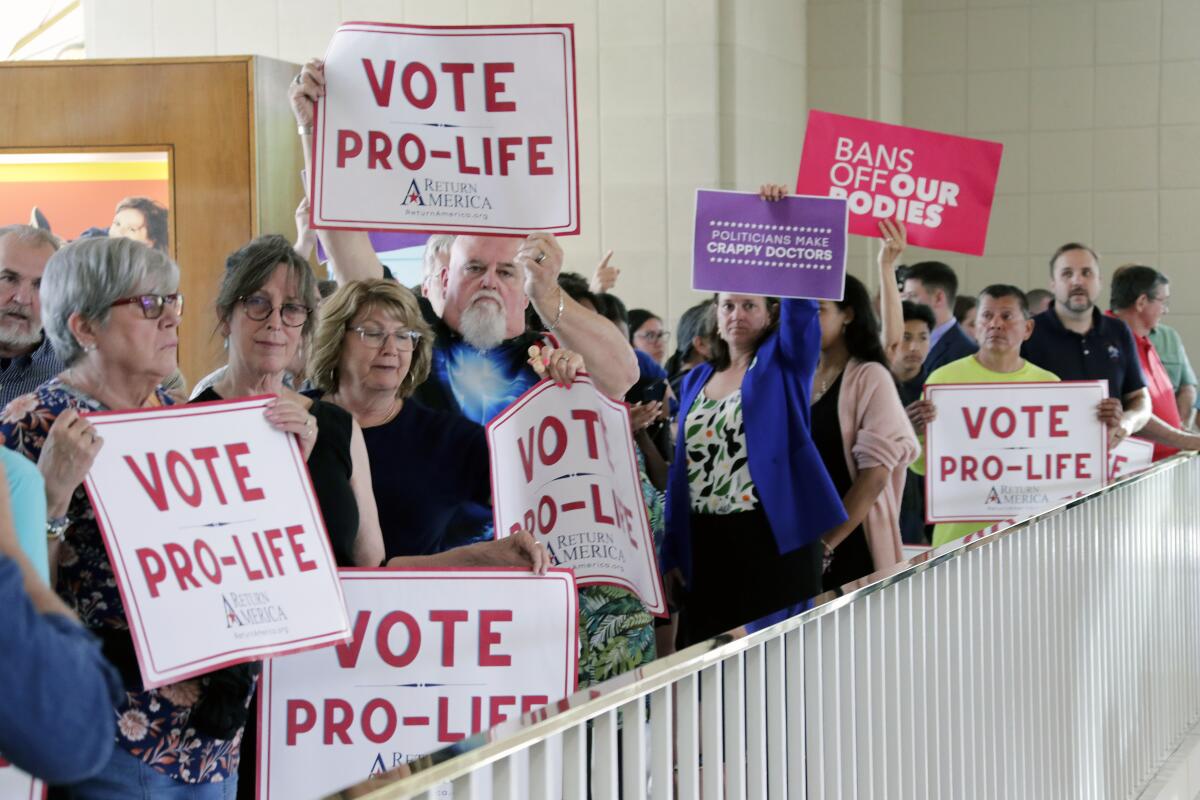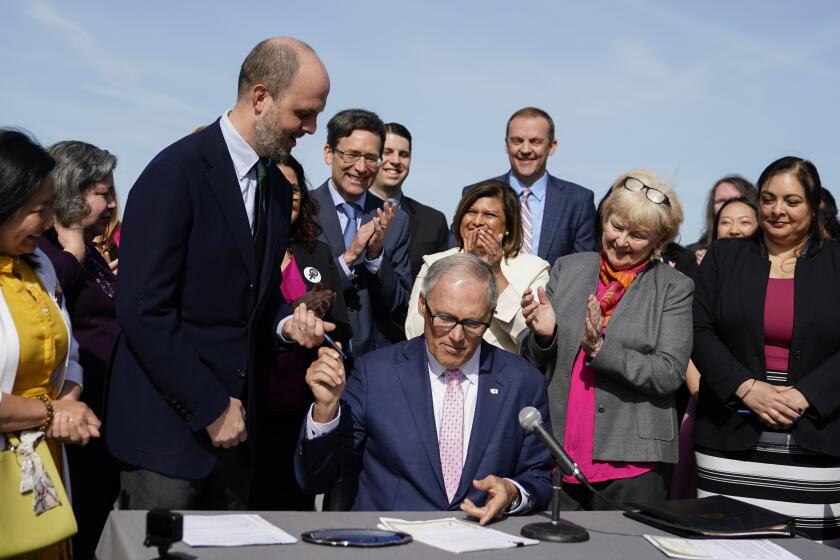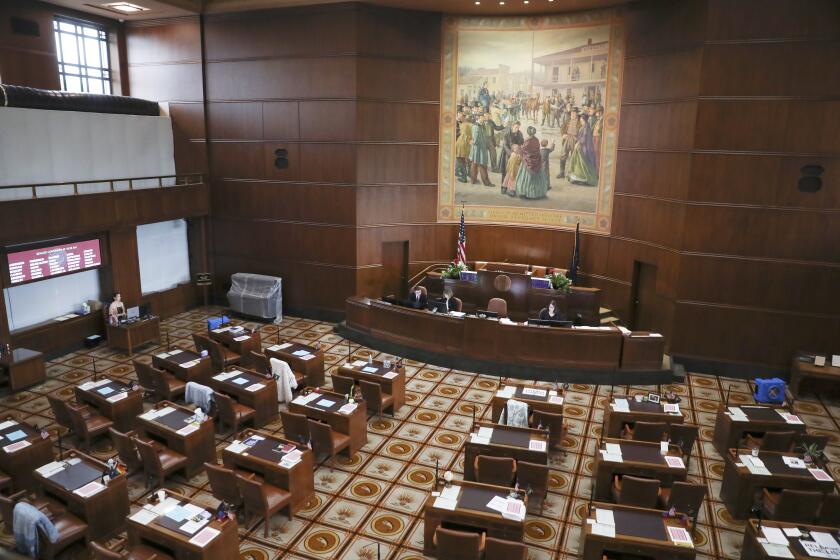North Carolina GOP Legislature overrides veto of 12-week abortion limit, allowing it to become law

RALEIGH, N.C. — Legislation banning most abortions after 12 weeks of pregnancy will become law in North Carolina after the state’s Republican-controlled General Assembly successfully overrode the Democratic governor’s veto late Tuesday.
The House completed the second and final part of the override vote Tuesday night after a similar three-fifths majority voted for the override earlier Tuesday in the Senate. The outcome represents a major victory for Republican legislative leaders who needed every GOP member on board to enact the law over Gov. Roy Cooper’s opposition.
Cooper vetoed the measure over the weekend after spending last week traveling around the state to try to persuade at least one Republican to uphold his expected veto.
Republicans have pitched the measure as a middle-ground change to state law, which currently bans nearly all abortions after 20 weeks of pregnancy, without exceptions for rape or incest.
The vote came as abortion rights in the U.S. faced another tectonic shift with lawmakers considering sharply limiting abortion in North Carolina and South Carolina, two of the few remaining Southern states with relatively easy access.
North Carolina’s Democratic governor has vetoed legislation that would have banned nearly all abortions after 12 weeks of pregnancy.
Nebraska joined the two states in debating abortion restrictions Tuesday that are possible because the U.S. Supreme Court last year struck down the landmark 1973 Roe vs. Wade ruling, which established a nationwide right to abortion.
Under another bill up for a vote Tuesday in the South Carolina House, abortion access would be almost entirely banned after about six weeks of pregnancy — before women often know they’re pregnant. The South Carolina state Senate previously rejected a proposal to nearly outlaw abortions.
Abortion is banned or severely restricted in much of the South and is now banned throughout pregnancy in Alabama, Arkansas, Kentucky, Louisiana, Mississippi, Oklahoma, Tennessee, Texas and West Virginia. In Georgia, it’s allowed only in the first six weeks.
The Carolinas, Florida and Virginia are now the main destinations in the region for those seeking legal abortions. Florida has a ban that kicks in 15 weeks into pregnancy. Under a recent law, that would tighten to six weeks pending a court ruling. Farther west, women often travel to Illinois, Kansas, New Mexico or Colorado.
Nationally, bans on abortion throughout pregnancy are in effect in 14 states.
A Texas man who didn’t want his girlfriend to get an abortion fatally shot her after she returned from having the procedure in Colorado, police say.
If both the North and South Carolina bans become law, combined with Florida’s recent ban, “it would be just devastating for abortion access in the South,” Jamie Lockhart, executive director of Planned Parenthood Advocates of Virginia, said Tuesday.
During the North Carolina Senate debate, Republicans said Cooper ignored $160 million within the measure that would boost funding to increase contraceptive services, reduce infant and maternal mortality and provide paid maternity leave for state employees and teachers.
“North Carolinians watching this debate, you are bearing witness to exaggerated and extremist objections from some Democrats,” Republican Sen. Vickie Sawyer of Iredell County said. “Their anger is that this bill is mainstream and a commonsense approach to a very difficult topic.”
Democrats focused on details of the abortion rules, which they said would place barriers between women and their doctors, leaving those who are pregnant in danger.
And the 12-week cutoff means that young women will have potentially only a couple of weeks to decide whether an abortion is the right decision, leading them to continue with unwanted pregnancies, Democratic Sen. Natasha Marcus of Mecklenburg County said.
“This bill is a slap in the face. It is a muzzle over our mouths, and it is a straitjacket on our bodies,” Marcus said. After the Senate vote, loud chants of “Shame!” could be heard outside the chamber doors.
Washington state and Minnesota enact legal protections for people who travel to there seeking reproductive and gender-affirming procedures and treatment.
Antiabortion protesters who arrived hours before the vote packed the North Carolina Senate gallery, with about 150 supporters of the proposed ban holding identical “Vote Pro-Life” signs.
“So many Republicans have just keeled over from pressure from all the groups who are just filled with hate and are pushing things that are going against God,” said Sharon Dooley, 63, of Garner, N.C.
In South Carolina, the impasse dates back to a special session last fall when House lawmakers demanding a near-total ban did not meet to negotiate with their Senate counterparts pushing for a ban around six weeks.
The stalemate persisted even after the state Supreme Court in January struck down a previous law banning abortions once cardiac activity is detected.
That decision left abortion legal through 22 weeks of pregnancy. A sharp increase in abortions since then has rankled Republicans.
The House was weighing a Senate bill similar to the one they denied last year. The measure would ban abortion when an ultrasound detects cardiac activity, around six weeks.
A late night is expected even after Republicans invoked rules to limit debate. House Speaker Murrell Smith has said the chamber will not adjourn until the measure gets approval. Democrats slowed the process Tuesday by speaking for all three allotted minutes on each of their hundreds of amendments and forcing other procedural votes.
GOP members of the Oregon Senate extend their boycott a second day, delaying bills on gun safety, abortion rights and gender-affirming healthcare.
Lawmakers in Nebraska were debating a proposal that would ban abortion at 12 weeks of pregnancy. The proposal comes after lawmakers rejected a bill last month that would have banned abortion after cardiac activity is detected.
This latest proposal is tacked onto a bill that would ban gender-affirming care for transgender minors. Conservatives in Nebraska’s single-chamber, nominally nonpartisan Legislature will need 33 out of 49 votes for these proposals to advance.
In Montana, Republican Gov. Greg Gianforte’s office announced Tuesday that he had signed into law a bill that makes performing the abortion method most commonly used after 15 weeks of gestation a felony. Planned Parenthood of Montana asked a judge to temporarily block the ban on dilation and evacuation abortions.
A separate challenge to abortion access will be considered Wednesday, when a federal appeals court hears arguments on whether the Food and Drug Administration’s approval of the widely used abortion drug mifepristone should be overturned. A three-judge panel of the 5th U.S. Circuit Court of Appeals will review a ruling last month by a federal judge in Texas who ordered a hold on approval of mifepristone, a decision that overruled two decades of scientific approval of the drug. That ruling was stayed while the appeal is pending.
The three judges who will hear the case each have a history of supporting restrictions on abortion. A ruling is not expected immediately.
Lavoie reported from Richmond, Va. Associated Press writers James Pollard and Jeffrey Collins in Columbia, S.C., Geoff Mulvihill in Cherry Hill, N.J., Amy Beth Hanson in Helena, Mont., and Sarah Rankin in Richmond contributed to this report. Schoenbaum and Pollard are corps members for the Associated Press/Report for America Statehouse News Initiative. Report for America is a nonprofit national service program that places journalists in local newsrooms to report on undercovered issues.
More to Read
Sign up for Essential California
The most important California stories and recommendations in your inbox every morning.
You may occasionally receive promotional content from the Los Angeles Times.














